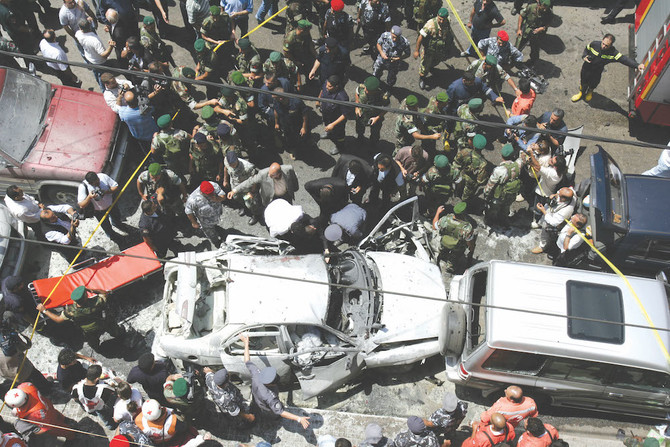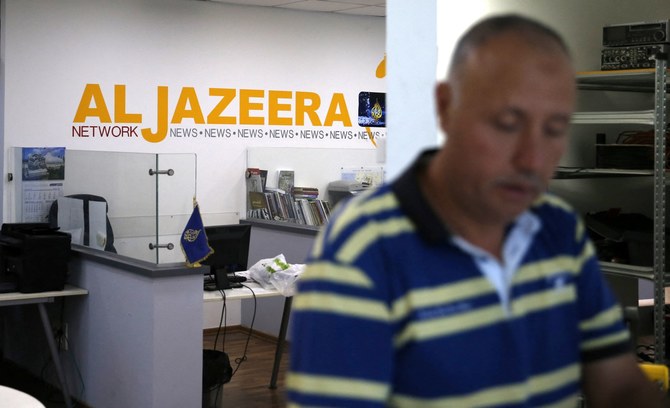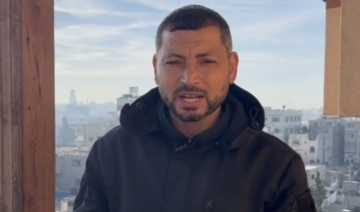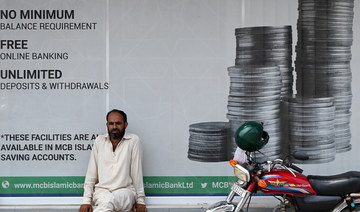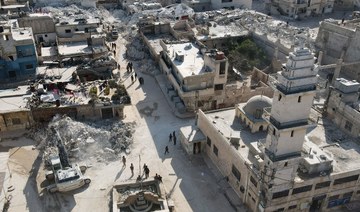LONDON: The murder of Saudi Arabian columnist Jamal Khashoggi on Oct. 2 has thrown new light on the dangers Arab reporters face in the Middle East — one of the deadliest regions for journalists. War, terrorism and a lack of space for freedom of expression means many of the region’s writers risk death, injury, kidnapping or arbitrary imprisonment in their efforts to hold power to account.
A total of 13 journalists were killed in the region in 2017 with more than 40 journalists or citizen-journalists currently detained, kidnapped or disappeared, according to the organization Reporters Without Borders (RSF). Middle Eastern countries consistently find themselves at the bottom of the organization’s annual World Press Freedom Index, which ranks 180 countries in order of the level of freedom given to journalists.
The civil war in Syria continues to make the country one of the most dangerous places to operate as a journalist. It is ranked at 177 in the index, only three positions higher than North Korea. Last year, a total of nine journalists were killed in the line of duty. This year to-date two journalists and six citizen-journalists have been killed.
The continuing conflict in Yemen — which ranks at 167 in the 2018 index — means journalists are at risk of being killed by airstrikes or attacks by warring factions.
Reporters in Iraq — ranked at 160 — are often targeted by gunmen by both pro-government militant groups and opposition groups such as Daesh.
In Qatar — ranked at 125 in the index — journalists have been dragged into the dispute between the Gulf state and a Saudi-led group of Arab countries that began in mid-2017. RSF cited other reports of non-Qatari journalists being harassed at Qatari TV channels.

Arab News has compiled a list of some of the region’s most prominent Arab journalists who have lost their lives.
1. Jamal Khashoggi
Jamal Khashoggi was a well-known journalist and columnist who was murdered inside Saudi Arabia’s consulate in Istanbul on Oct. 2 He was a prominent Arab writer who had worked for numerous publications including Arab News. He covered high-profile stories such as the Soviet invasion of Afghanistan. At his time of death, he was a columnist for The Washington Post.
2. Yasser Murtaja
Murtaja was a Palestinian photographer working for a Gaza-based photo agency Ain Media. He was killed earlier this year during clashes between Palestinian protesters and Israeli forces on the border between Gaza and Israel on April 7. News reports said Murtaja was clearly identifiable as a journalist wearing a protective vest with the word “press” on it. The Israeli military issued a statement at the time saying it did not intentionally fire on journalists.
3. Saif Talal
Saif Talal was a broadcast reporter for the independent television channel Al-Sharqiya. He was shot dead along with his cameraman Hassan Al-Anbaki on Jan. 12, 2016. According to news reports, Talal and Al-Anbaki were killed by unidentified gunmen who forced them to get out of their car as they were driving near the city of Baquba in Iraq, according to the Committee for the Protection of Journalists (CPJ).
4. Almigdad Mojalli
Almigdad Mojalli was a Yemeni freelance journalist working for international media outlets including the UK’s The Telegraph. He was killed in an air strike on Jan. 17, 2016 just outside the capital of Sanaa while he was working for the Voice of America, according to the radio broadcaster.
 5. Basil Al-Sayed
5. Basil Al-Sayed
Al-Sayed was just 24 years old when he was killed in the Syrian city of Homs in December 2011. He was shot in the head by security forces, according to new reports. He was one of many Syrians who became amateur journalists, recording the government’s use of force against protesters. Citizen journalists played a crucial role in getting information out of Syria at a time when foreign journalists were banned from entering the country by the government.
6. Atwar Bahjat
Atwar Bahjat was a high-profile Iraqi TV journalist who was shot dead on Feb. 22, 2006 while covering the bomb attack on the Shia Al Askari Mosque in Samarra in Iraq. She had been working for Al-Arabiya in the last few weeks of her life, having previously also worked as a correspondent for Al Jazeera. She started her career at Iraq state-controlled TV.
7. Gebran Tueni
Gebran Tueni was the former editor of An Nahar — the Lebanese paper founded by his grandfather. He was killed by a car bomb on Dec. 12, 2005 in a suburb of Beirut. His death came in the same year his newspaper’s columnist Samir Kassir was killed by a car bomb. Both journalists had been critical of Syria’s policies toward Lebanon.
8. Samir Kassir
Samir Kassir was a Lebanese journalist — best-known as a columnist for the daily newspaper An Nahar. He was killed on June 2, 2005 in Beirut by a bomb placed under his car. He had been a prominent advocate for freedom of press in Lebanon and an outspoken critic of Syria’s presence in Lebanon. Following his death, the Samir Kassir Foundation was established to continue his work.
9. Tareq Ayoub
Tareq Ayoub was an Al Jazeera correspondent killed in Iraq on April 8, 2003 during a US airstrike that hit the TV station’s Baghdad bureau. Ayoub, a Palestinian, was just 35 years old when he was killed. His cameraman was injured in the blast. He had previously worked as a correspondent in Amman.
10. Kamel Mroueh
Kamel Mroueh was a prominent Lebanese journalist who founded the pan-Arab newspaper Al-Hayat. He was shot on May 16, 1966 by a gunman who entered the newspaper’s offices in Beirut.


